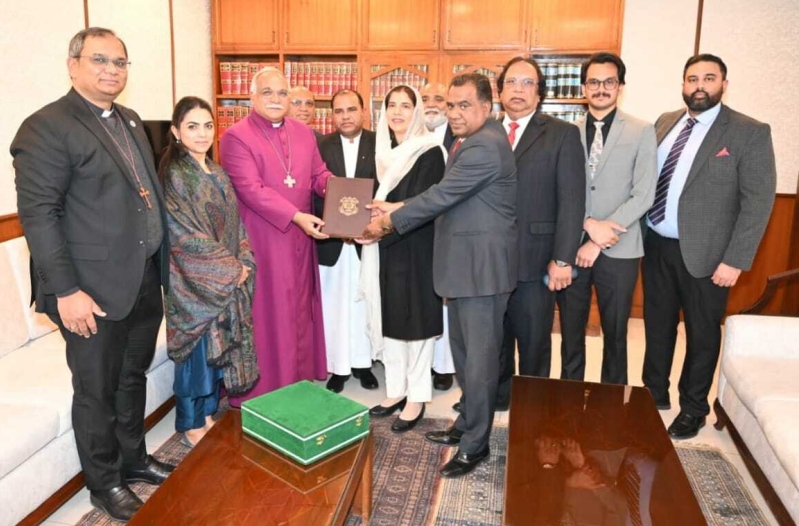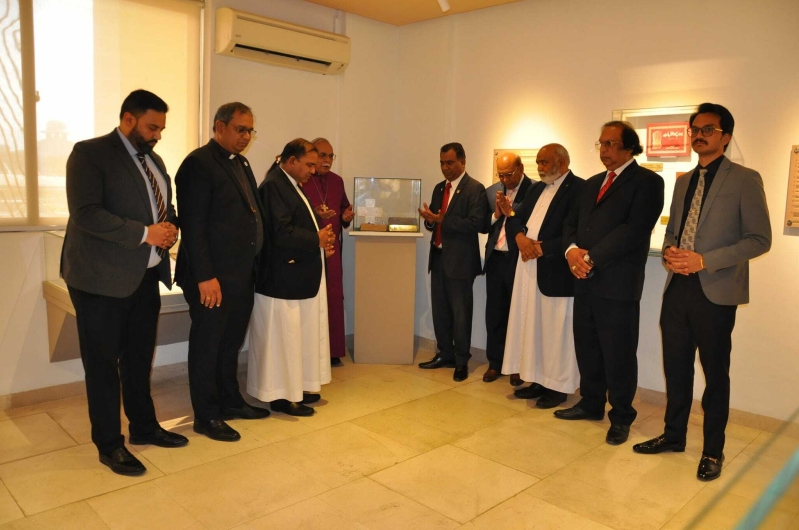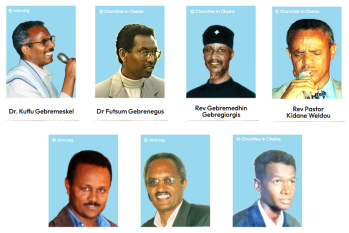
In a historic gesture of interfaith harmony last week, Christian leaders in Pakistan on Wednesday presented two significant religious artifacts to the Supreme Court of Pakistan for curation in its museum.
The artifacts, a copy of the Bible dating back to 1611 and a replica of the Cross of Saint Thomas, symbolize the rich tapestry of religious diversity and the enduring presence of Christianity in the region.
The Bible, known as the King James Version, was commissioned in 1611 and represents a pivotal moment in the history of Christianity, marking the translation of holy scriptures into English, a language accessible to the common people.
The Cross of Saint Thomas stands as a testament to the apostle’s missionary work in India and his influence that extends to Pakistan.
“The placement of these Christian artifacts in the Supreme Court’s museum is more than a symbolic act; it is a reaffirmation of Pakistan’s constitutional commitment to protect the rights of all its citizens, regardless of their faith,” said Supreme Court of Pakistan’s first female Registrar, Jazeela Aslam.
Addressing a delegation of Christian leaders led by Church of Pakistan President Bishop Azad Marshall, the Registrar said that the superior courts of the country were committed to upholding minority rights.
“The Constitution of Pakistan guarantees the equality of all citizens irrespective of their faith affiliations. The protection of minority rights is not merely a legal obligation, it’s also a moral responsibility of the state,” she said.
Aslam said that the tenets of equality, protection of minority rights, and religious freedom were also highlighted by Pakistan's founder, Quaid-e-Azam Muhammad Ali Jinnah.
“In his August 11, 1947 historic speech to the Pakistani Constituent Assembly, Jinnah made a few noteworthy remarks concerning minorities. He outlined the ideals that should guide the newly formed country's government in this speech,” she said.
She added that various constitutional provisions, including Article 20 (freedom of religion), Article 25 (equality of citizens), Article 36 (protection of minorities), and Article 37 (promotion of social justice and eradication of social evils), explicitly ensure the rights and freedoms of minorities.
“However, the effective implementation of these provisions faces challenges rooted in discrimination, intolerance, violence, and extremism. Consequently, the role of the judiciary, particularly the Supreme Court of Pakistan, emerges as pivotal in upholding and enforcing the rights of minorities in our nation,” she concluded.

Speaking on the occasion, Bishop Marshall lauded the judiciary's commitment to upholding justice and equality for all citizens.
However, the senior bishop said that Pakistani minorities continued to face the challenge of the implementation of their rights despite the constitutional guarantees.
“Today, we stand united in our diversity, presenting these artifacts as symbols of our shared heritage and mutual respect. The Supreme Court, the guardian of our constitution, now houses tokens of our faith, reminding us that justice and rights are not bound by religion or creed,” he said.
Bishop Marshall further highlighted the importance of access to justice and the provision of constitutional rights to minority Christians.
“The presence of these sacred items in the highest court of the land is a beacon of hope for minority communities. It reassures us that our voices are heard, and our rights are safeguarded. It is a step towards eradicating the shadows of discrimination and ensuring that justice is blind to differences, serving all with equality,” he said.
The event is being hailed as a significant step towards promoting unity and religious diversity in Pakistan.
“It serves as a powerful reminder of the country’s rich cultural mosaic and the enduring spirit of tolerance that is essential for the nation’s progress,” said Catholic priest Khalid Mukhtar.
Father Mukhtar serves as a parish priest in Jaranwala which witnessed violent attacks on multiple churches and homes of Christians on August 16, 2023 after two Christians were falsely accused of desecrating the Quran and writing blasphemous content.
“We hope that the Supreme Court will also ensure justice in the Jaranwala case, which is crucial to restore the confidence of the Christian community in the law of the land,” he said.
On February 14, a three-judge bench of the Supreme Court headed by Chief Justice of Pakistan Qazi Faez Isa had rejected a report submitted by the Punjab provincial government on the Jaranwala incident, terming it “worthy of being thrown into the dustbin.”
The bench gave a 10-day deadline to the Punjab government to submit a fresh report explaining why a majority of the suspects detained in the Jaranwala incident had been granted bail by the courts.





